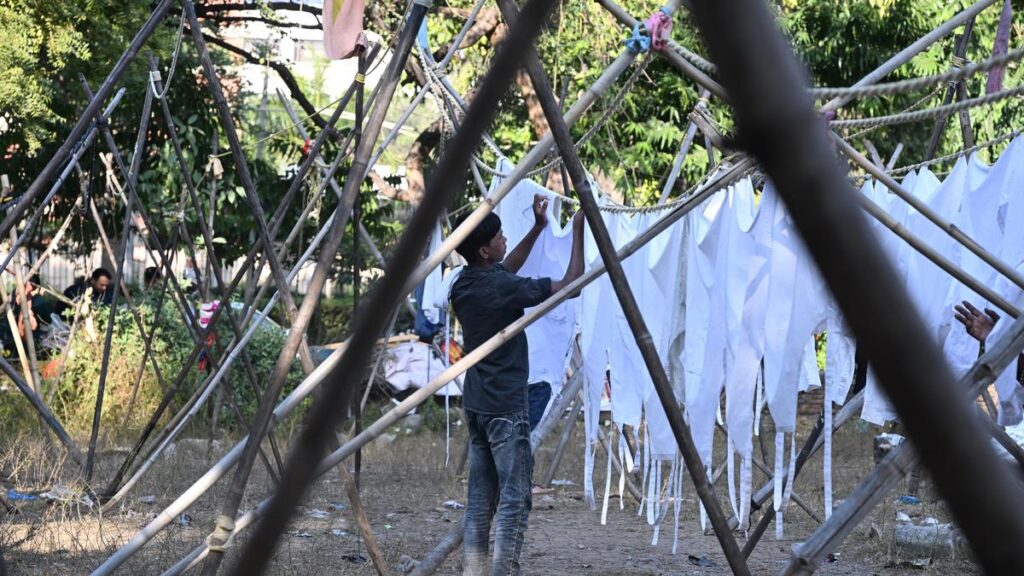Tucked away in central Delhi’s winding alleys, with white linen hanging over wires, a community of dhobis has been washing the city’s clothes for generations. Threatened by the constant spectre of demolition, members of the community say welfare measures announced for their benefit can be enjoyed only if their homes and workplaces are protected.
Ahead of the Delhi Assembly election, the locality is awash with flags and banners of AAP, Congress, and BJP. Several ‘Jai Sri Ram’ flags are also hoisted in many houses.
The ruling AAP has made several promises to the dhobi community, aiming to improve their standard of living and access to basic services. On January 21, party chief Arvind Kejriwal had vowed to regularise makeshift ironing stands and resume commercial licensing for dhobis if his party retains power.
He announced seven guarantees, including providing electricity and water at domestic rates, quality education and scholarships for children, skill training for youth, and welfare schemes for the elderly in the community. He also proposed establishing a ‘Dhobi Samuday Welfare Board’ to address the community’s concerns and accept suggestions to formulate policies to enhance their profession across Delhi.
Tinku Kanojia, 35, works as a dhobi by day and drives an autorickshaw by night to make ends meet. On a typical afternoon, he can be found sitting on the footpath at a dhobi ghat on DDU Marg, collecting dirty clothes and worrying about meeting his daily target.
Mr. Tinku stands to benefit from two schemes announced by AAP, a life insurance cover of ₹10 lakh for autorickshaw drivers and a welfare initiative for dhobis. Despite this potential support, he remains pessimistic about his future in the city. “There is no dignity left in this work. Every day, we live in fear of receiving a demolition notice to make way for new buildings,” he says.
Rising competition
Sanjeev Kanojia, 34, a third-generation dhobi, shares a similar story as he adds detergent to his large iron washing machine. His family has witnessed the transformation of the profession and area over the years, with the emergence of new laundry companies and improved communication and services.
Despite earning around ₹20,000 from washing clothes, Mr. Sanjeev’s monthly expenses for chemicals, detergent, water, electricity, and fuel amount to ₹8,000. Highlighting the struggles of the community, he points out that two nearby dhobi ghats recently shut down.
Despite receiving orders from houses, hospitals, and hotels, and expanding their business to Noida and Gurugram, Mr. Sanjeev says their work has been impacted by people from various communities starting their own laundry companies. He notes that the lack of “sangathan (unity)” among the dhobi community has prevented them from voicing their concerns. He says many people are gradually quitting the business.
Rajjo Devi, 60, runs a small general store, but with barely any customers, she spends most of her time outside, watching her husband sort clothes. Struggling to make ends meet, she made the tough decision to steer her son away from the family business, encouraging him to find more stable work as a security guard. With a tinge of sadness, she acknowledges that the traditional dhobi business will “die slowly” with her generation.
Fear of demolition
Laxmi Devi, a 58-year-old resident, echoes the concerns of many living in jhuggis, who face the constant threat of demolition. She brings up the promise of ‘Jahan jhuggi, wahan makan (Where there are jhuggis, there will be homes)’, an in-situ rehabilitation programme, and wonders if it’s more than just an empty election promise. “Will the government actually allot houses to people?” she says.
Expressing her deep-seated fear, she says, “We’re already out on the streets for work now. If our homes are demolished tomorrow, nobody will come forward to speak for our rehabilitation.”
Residents also complain about the area’s lack of basic infrastructure, citing the sole public toilet that serves the entire community as an example. They point out that the road in the locality was constructed 30 years ago, underscoring the community’s long-standing neglect.
DDU Marg falls within the New Delhi constituency, a highly contested battleground where Mr. Kejriwal, a former Delhi Chief Minister, is pitted against BJP’s Parvesh Verma, the son of former Delhi CM Sahib Singh Verma, and Congress’s Sandeep Dixit, the son of former Delhi CM Sheila Dixit.
Published – January 29, 2025 01:36 am IST
Source:https://www.thehindu.com/news/cities/Delhi/welfare-schemes-mean-little-without-secure-homes-say-dhobis-of-delhi/article69152242.ece

